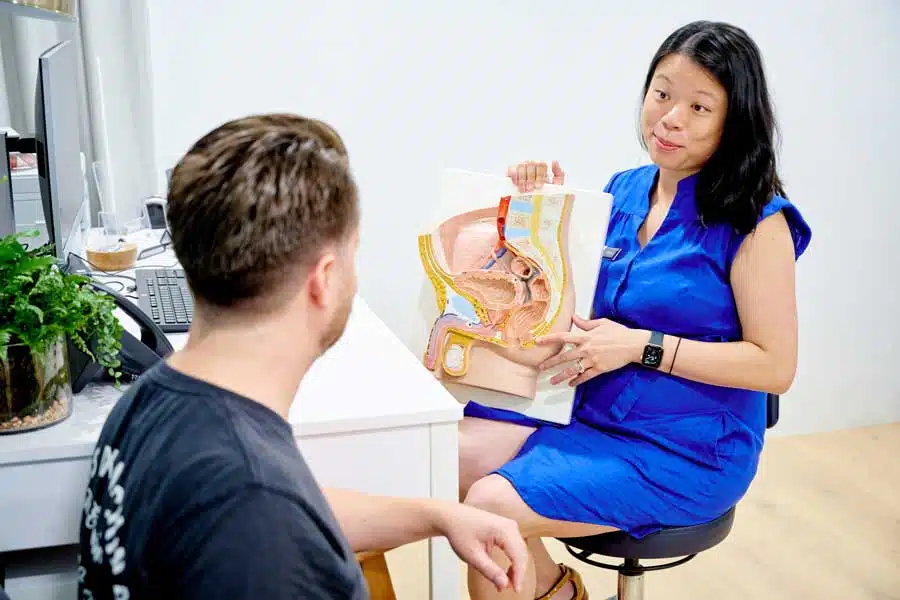Have you ever found yourself dealing with sudden anal pain? Rectal pain can be caused by a number of different conditions and can present itself with a variety of different symptoms.
In some cases, rectal spasm pain is a result of either proctalgia fugax or pudendal neuralgia. Though both proctalgia fugax and pudendal neuralgia are similar in nature, looking at their specific symptoms reveals their differences.
Let’s take a look at these two different anorectal disorders to paint a picture of what they are and their specific symptoms. Then, we’ll explore the different ways to go about treating rectal spasms and pain depending on which of these two disorders you are dealing with.
Getting Treatment for Anal Pain
What conditions cause pain in the anus and rectum? There are tons of different conditions out there that can lead to severe spasms and/or pain in the anorectal region.
From conditions like irritable bowel syndrome to chronic constipation, there are many different things that can cause the onset of anal pain. For many patients, pursuing treatment can feel embarrassing. Issues that deal with the rectum and bowels can often feel private, leading patients to believe they shouldn’t bring it up with a GP, hoping the issues they experience will resolve themselves.
If you’re experiencing anorectal pain, you are not alone, and deserve proper treatment. Painful conditions like the two we’re discussing here have treatment options available that can do wonders to lessen symptoms, and help a person live a healthy, everyday life.
The conditions we’re going to discuss in this article – proctalgia fugax and pudendal neuralgia – are two anal pain conditions that some people face. Let’s explore them more in-depth:
What is Proctalgia Fugax?
Proctalgia fugax is a condition where a person will experience pain, spasms, and cramping in the anus and rectum. These painful muscle spasm symptoms that cause pain can happen in the internal anal sphincter muscles, anal canal, and pelvic floor muscles. They can last anywhere from a few seconds to severe spasms that last several minutes.
Proctalgia Fugax Symptoms
The most common proctalgia fugax symptom is pain, which can present as:
- Sharp pain/severe pain in the buttocks and/or rectum
- Severe cramps in the rectal area and/or pelvic floor
Proctalgia Fugax Causes
What causes this condition? There are many different issues that can make a person more at risk of experiencing proctalgia fugax. These include:
- Constipation
- Defecation
- Menstruation
- Stress
- Sexual Activity
It is important to note that while outside conditions can cause proctalgia fugax, there are many cases where this condition can appear seemingly without cause. There are also instances where hereditary proctalgia fugax could be the reason behind your symptoms.
Treating Proctalgia Fugax
The best way to receive treatment for proctalgia fugax is to get insight from your GP, and if needed, pursue treatment with a physiotherapist.
Treatment with a physiotherapist will begin with an assessment of the anorectal region to determine the source of your anorectal pain. If it is found that a patient is dealing with proctalgia fugax, treatments can include:
- Education on the condition
- Pelvic floor muscle exercises and stretches
- Physio breathing techniques
- Enemas
- Epsom salt and/or sitz baths
- Lifestyle modifications
- Electric stimulation of the anorectal muscles
- Botox injections
The most important thing when seeking treatment is understanding your triggers that cause the onset of pain. Whether it’s a bowel movement or certain types of physical movement, identifying triggers is where one can start with treatment.
Once triggers are understood, you can begin treatment that addresses pelvic floor muscle tension and create a routine that minimises pain. With time, the anorectal pain a patient is experiencing can be alleviated.
What is Pudendal Neuralgia?
Pudendal neuralgia is a condition where a person will experience pain in the pelvic region, genitals, or anorectal muscles. This is a result of compression/irritation of the pudendal nerve, a nerve that runs from the back of the pelvis to the base of a person’s genitals.
Pudendal Neuralgia Symptoms
Pudendal Neuralgia typically presents with any of the following symptoms:
- Altered sensation levels in the genitals
- Pelvic pain/genital pain/anorectal pain (sharp, burning, or stabbing sensation)
- Itching and swelling in the rectum/perineum
- Pain/irritation while urinating (feelings similar to a UTI)
Pudendal Neuralgia Causes
As we touched on above, this condition is a result of the compression of the pudendal nerve. This can often happen as a result of:
- Prolonged periods of sitting
- Physical activity that strains the pelvic area (sitting, horseback riding, cycling)
- Severe constipation
- Damage to the pelvic area (broken bones, surgery to the pelvis/hip/back)
- Pudendal nerve damage during childbirth
- A cancerous growth on/around the pudendal nerve
Pudendal Neuralgia Treatment
To address pain as a result of this condition, a patient should seek treatment from a GP and a physiotherapist.
In many cases, this condition can be simply identified by a patient describing their symptoms. In other cases, a surgeon can perform a pudendal nerve block. If symptoms alleviate, then it becomes clear pudendal neuralgia was the cause of pain.
If this condition has been identified, there are different treatment options available that can help to alleviate symptoms. These include:
- Educating the patient on the condition
- Internal/external release exercises to offload nerve pressure
- Pelvic stretches/Pelvic breathing
- Pelvic neurodynamics (flossing of the nerve)
- Self-release on pelvic floor muscles using a therawand
- Changes to patient lifestyle (Less time sitting, decompressive cushions, etc.)
Seeking Treatment for Anorectal Pain
If you are a person who is experiencing anorectal pain as a result of either of these conditions, there is help available that can alleviate your symptoms.
The team at Sydney Pelvic Clinic is here and ready to help. We have an experienced team of physiotherapists who are fully prepared to help identify the source of anal pain. Once identified, we can create a treatment plan custom to you, to help you get back to living a normal life.
Need a consultation? Click here to learn more and book one today

